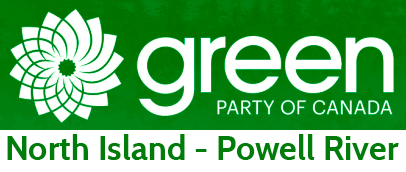Media Release
January 23, 2020
For Immediate Release
NIPR GREENS STAND WITH WET’SUWET’EN
Hereditary Chiefs Continue to Protect Territory in Defiance of Court Decision
by Tim Larsen, Powell River
Members of the North Island-Powell River (NIPR) Greens are united with all Green Party of Canada (GPC) and BC Green members in support of the Wet’suwet’en hereditary chiefs in the assertion of their hereditary rights. The chiefs oppose the building of the Coastal GasLink (CGL) pipeline, designed to move fracked gas to Kitimat in northern BC, through Wet’suwet’en territory.
Paul Manly, the Green MP for Nanaimo-Ladysmith who visited the camp last weekend, says this dispute is a fight for Indigenous rights and climate justice. “We know that this pipeline and the LNG project in Kitimat that it serves are a climate disaster in the making,” he said. “The hereditary chiefs not only need to be consulted, they need to be heard. I stand with these chiefs who have peacefully protested to protect their land and call on the provincial and federal governments to respect the stand they have taken.”

Paul Manly on his visit in support of Wet’suwet’en land protectors
Although he was in the area and visited the LNG site in Kitimat, Premier Horgan did not meet as requested by the Wet’suwet’en. Horgan is quoted in this CBC article that, “I’m not going to drop everything I’m doing to come running when someone is saying they need to speak with me…I’m not being disrespectful, I’m just saying be realistic here.” “If you’re going to have decent communication with anybody, it’s best to be looking eye to eye,” said hereditary chief Na’Moks.
However, MLA (and BC Green Party interim leader) Adam Olsen also visited the site in support. The Greens support the United Nations Declaration of the Rights of Indigenous Peoples (UNDRIP.) Although the Government of British Columbia has enshrined UNDRIP in its much-touted Declaration of the Rights of Indigenous Peoples Act (DRIPA), the Premier has said that the “rule of law” must prevail.

Adam Olsen with hereditary chief Na’Moks
Horgan is referring to the law that was imposed by the colonial settler regime on bands and elected councils. As Olsen pointed out, “It’s pretty clear that the Canadian court system has recognized Indigenous law as part of the broader legal context in this country and in this province. We’re sitting in territory where the court decisions reference and explain the very, very sophisticated order that this territory has been governed by since time immemorial.”
Coastal GasLink has negotiated agreements with some of the bands’ elected councils along the pipeline route. These agreements are the basis of the company’s claim that they have met the criteria of for meaningful talks with First Nations. In light of UNDRIP, this claim rings hollow.
The Wet’suwet’en also asked for a meeting with Prime Minister Trudeau. However, no Trudeau government members have been to the camps. And the only governmental response - provincial or federal - to date has been to send in the RCMP in full combat gear one year ago, almost to the day. These militarized police violently breached the Wet’suwet’en territory at the Gidimt’en checkpoint, claiming they were dealing with “persons with radicalized ideology,” and issued orders to “use as much violence toward the [checkpoint] as you want.” So much for reconciliation.
-30-
CONTACT:
Mark de Bruijn
(250) 334-2724

